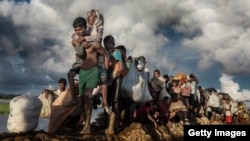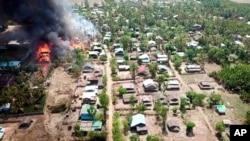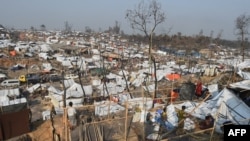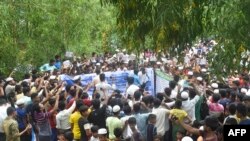This week marks five years since more than 700,000 Rohingya refugees fled violence and persecution in Myanmar, joining hundreds of thousands of other Rohingya who sought refuge in Bangladesh in previous years.
The events that caused nearly three-quarter-million people to take flight in August 2017 have not improved. Indeed, they have worsened. The United Nations reports Myanmar’s military junta has increased its brutal campaign of violence against the population. This, since it overthrew the country’s democratically elected government a year-and-a-half ago.
The U.N. refugee agency estimates 1.1 million Rohingya are internally displaced inside Myanmar, most in Rakhine State. The agency says the repressive conditions under which they live preclude the possibility of safe, dignified, and sustainable refugee returns to Myanmar.
Having passed five years in exile, the UNHCR reports the latest exodus from Myanmar is now officially defined as being a protracted situation. Refugees who live in this long-lasting state of limbo are dependent on international aid.
UNHCR spokeswoman Shabia Mantoo says her agency is appealing for increased support for the Rohingya. She says it is critical the international community continues to pay attention to the crisis, which is at risk of being forgotten.
“There must be a redoubling of efforts to find solutions for the Rohingya. The longer that this displacement situations protract, it becomes difficult to sustain support… We are facing a funding shortfall. That is really important that that international commitment and that funding is sustained to support both the Rohingya refugees but also their local host communities,” she said.
Some one million Rohingya refugees, nearly half of them children, live in extremely overcrowded conditions in Cox’s Bazar in Bangladesh, the world’s largest refugee camp.
Mantoo says the Rohingya remain fully reliant on humanitarian assistance for their survival. She says they need proper nutrition, shelter materials, sanitation, and livelihood opportunities.
“Protection needs — especially for women, children, and people with disabilities—are often under-reported," she said. "Violence against children and women, especially gender-based violence, is shrouded in stigma that can render survivors voiceless and unable to access legal, medical, psycho-social or other forms of support. Some have resorted to dangerous boat journeys to seek a future for themselves and their children.”
The UNHCR says support must be stepped up for education, skills development, and livelihood opportunities to prepare refugees for a hoped-for eventual return to Myanmar.
In the meantime, the agency is appealing for $455 million to provide lifesaving assistance this year to more than 1.4 million people, including Rohingya refugees and more than half-a-million most affected host communities.







